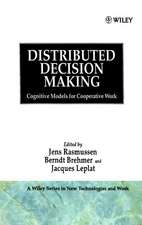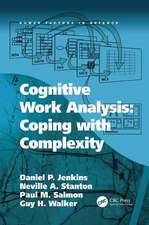Cognitive Systems Engineering: Wiley Series in Systems Engineering and Management
Autor J Rasmussenen Limba Engleză Hardback – 29 aug 1994
Din seria Wiley Series in Systems Engineering and Management
- 24%
 Preț: 601.74 lei
Preț: 601.74 lei - 24%
 Preț: 764.37 lei
Preț: 764.37 lei - 9%
 Preț: 847.20 lei
Preț: 847.20 lei - 9%
 Preț: 849.90 lei
Preț: 849.90 lei - 9%
 Preț: 895.18 lei
Preț: 895.18 lei - 9%
 Preț: 802.57 lei
Preț: 802.57 lei - 9%
 Preț: 797.31 lei
Preț: 797.31 lei - 9%
 Preț: 771.10 lei
Preț: 771.10 lei - 27%
 Preț: 842.46 lei
Preț: 842.46 lei - 27%
 Preț: 1174.31 lei
Preț: 1174.31 lei - 9%
 Preț: 689.76 lei
Preț: 689.76 lei - 9%
 Preț: 802.90 lei
Preț: 802.90 lei - 9%
 Preț: 743.66 lei
Preț: 743.66 lei - 27%
 Preț: 874.77 lei
Preț: 874.77 lei - 9%
 Preț: 1046.80 lei
Preț: 1046.80 lei - 9%
 Preț: 1000.66 lei
Preț: 1000.66 lei - 9%
 Preț: 988.88 lei
Preț: 988.88 lei - 8%
 Preț: 610.38 lei
Preț: 610.38 lei - 8%
 Preț: 619.67 lei
Preț: 619.67 lei - 27%
 Preț: 1036.82 lei
Preț: 1036.82 lei - 9%
 Preț: 1361.89 lei
Preț: 1361.89 lei - 9%
 Preț: 1014.45 lei
Preț: 1014.45 lei - 27%
 Preț: 940.05 lei
Preț: 940.05 lei - 9%
 Preț: 798.00 lei
Preț: 798.00 lei - 9%
 Preț: 1318.79 lei
Preț: 1318.79 lei - 23%
 Preț: 989.46 lei
Preț: 989.46 lei - 9%
 Preț: 1105.65 lei
Preț: 1105.65 lei - 9%
 Preț: 980.16 lei
Preț: 980.16 lei - 9%
 Preț: 819.69 lei
Preț: 819.69 lei - 8%
 Preț: 538.90 lei
Preț: 538.90 lei - 8%
 Preț: 424.15 lei
Preț: 424.15 lei - 27%
 Preț: 731.44 lei
Preț: 731.44 lei - 9%
 Preț: 928.20 lei
Preț: 928.20 lei - 9%
 Preț: 973.37 lei
Preț: 973.37 lei - 9%
 Preț: 870.66 lei
Preț: 870.66 lei - 9%
 Preț: 799.81 lei
Preț: 799.81 lei - 20%
 Preț: 684.99 lei
Preț: 684.99 lei - 9%
 Preț: 930.12 lei
Preț: 930.12 lei - 9%
 Preț: 1158.97 lei
Preț: 1158.97 lei - 8%
 Preț: 611.37 lei
Preț: 611.37 lei - 32%
 Preț: 958.65 lei
Preț: 958.65 lei - 31%
 Preț: 641.10 lei
Preț: 641.10 lei - 32%
 Preț: 1012.17 lei
Preț: 1012.17 lei - 31%
 Preț: 619.02 lei
Preț: 619.02 lei - 31%
 Preț: 755.42 lei
Preț: 755.42 lei - 32%
 Preț: 677.37 lei
Preț: 677.37 lei - 32%
 Preț: 666.99 lei
Preț: 666.99 lei - 32%
 Preț: 650.96 lei
Preț: 650.96 lei - 32%
 Preț: 938.63 lei
Preț: 938.63 lei
Preț: 1167.03 lei
Preț vechi: 1282.45 lei
-9% Nou
Puncte Express: 1751
Preț estimativ în valută:
223.38€ • 242.72$ • 187.76£
223.38€ • 242.72$ • 187.76£
Carte tipărită la comandă
Livrare economică 21 aprilie-05 mai
Preluare comenzi: 021 569.72.76
Specificații
ISBN-13: 9780471011989
ISBN-10: 0471011983
Pagini: 396
Dimensiuni: 167 x 239 x 27 mm
Greutate: 0.75 kg
Editura: Wiley
Seria Wiley Series in Systems Engineering and Management
Locul publicării:Hoboken, United States
ISBN-10: 0471011983
Pagini: 396
Dimensiuni: 167 x 239 x 27 mm
Greutate: 0.75 kg
Editura: Wiley
Seria Wiley Series in Systems Engineering and Management
Locul publicării:Hoboken, United States
Notă biografică
Descriere
The first comprehensive guide to designing highly usable, fully integrated computer-based information systems. Traditional human-computer interaction (HCI) and system design models have proven too narrow to adequately assess user needs and to design usable and efficient computer-based information support systems.























